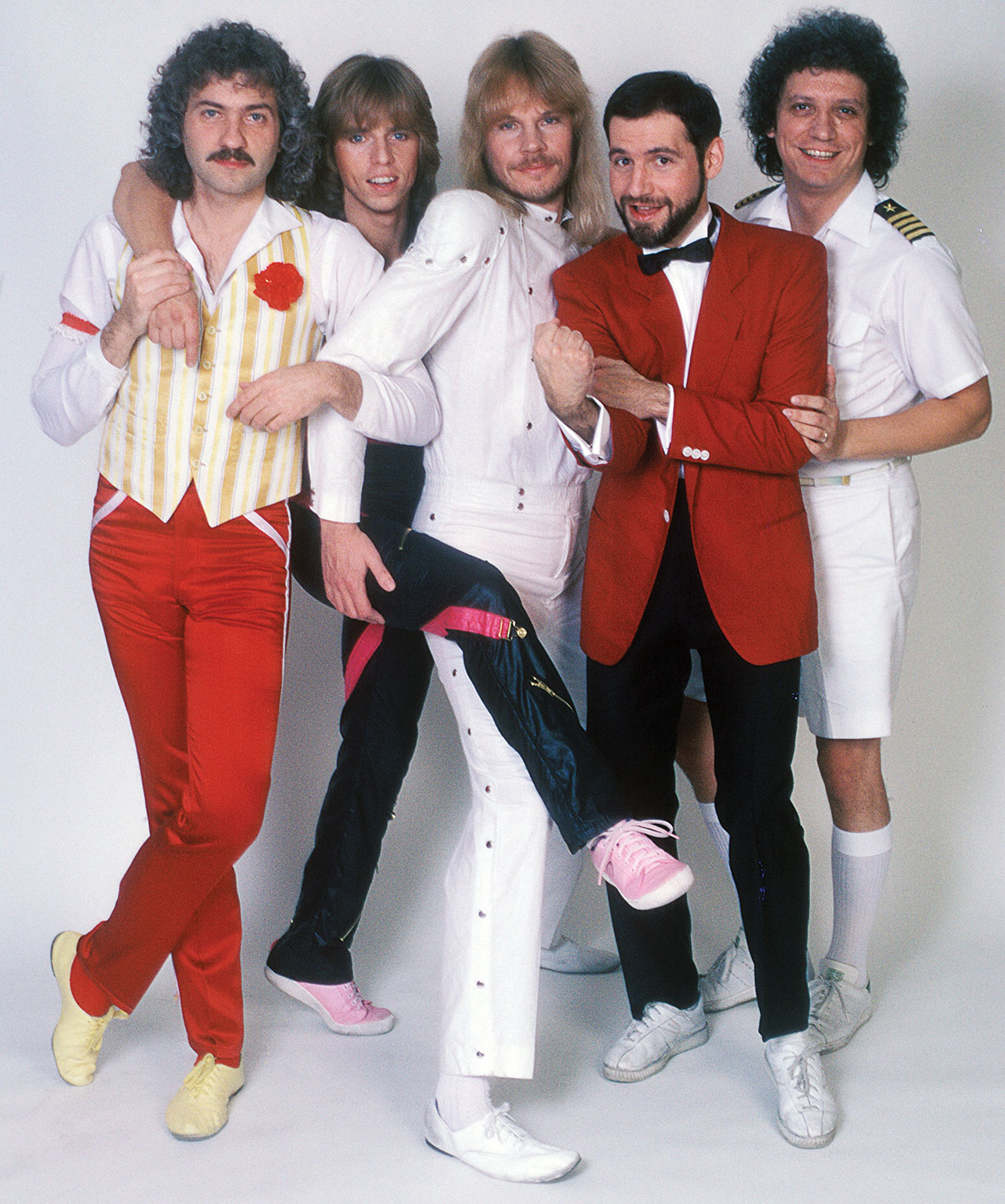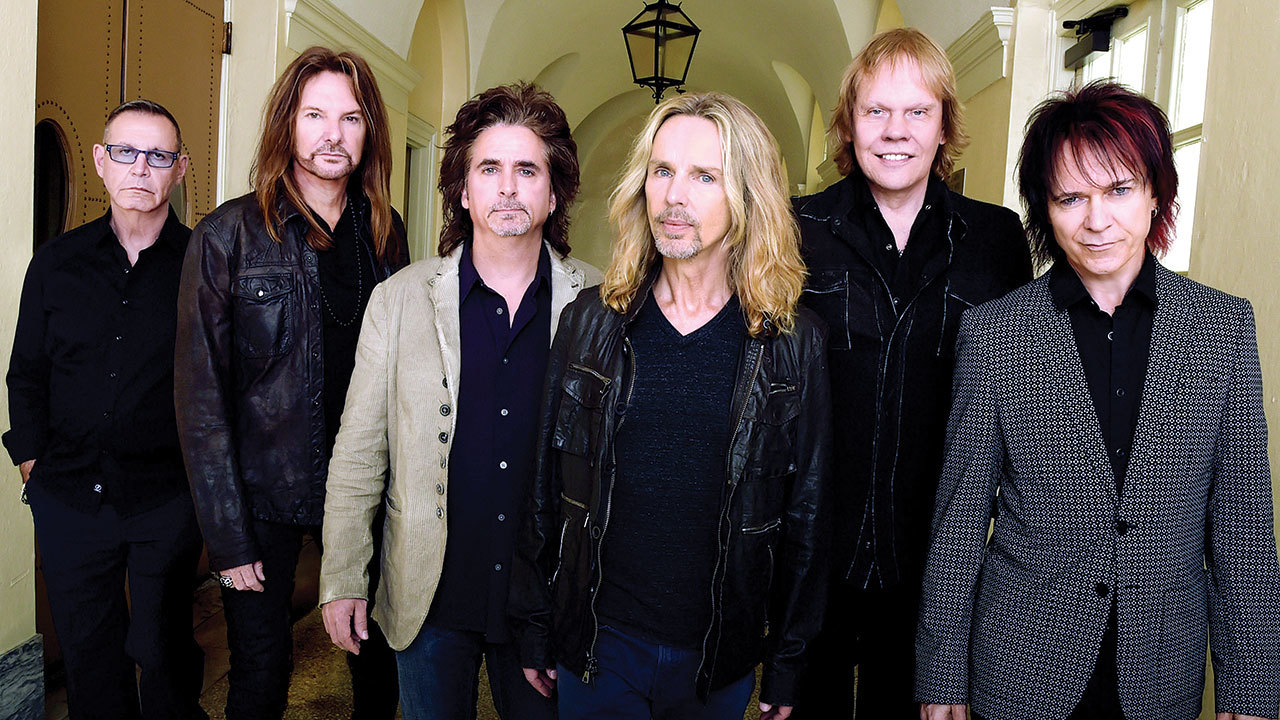Given what else he and his wife could do at home on any given night of the week, Styx guitarist Tommy Shaw – and indeed Mrs Shaw – must really like his band’s new album. That’s really, really like it.
“There’s a 5.1 version of it that will come out later in the year,” he says, laughing at the absurdity of what he’s about to say next. “Every so often I ask her: ‘Honey, do you want to get a glass of wine and sit in the studio and just absorb the thing in 5.1?’ And she loves to do that. We get completely lost in the storyline, the experience, the whole thing. It’s just a fucking trip.”
It had better be.
And it’s been a long trip for the Chicago band, The Mission being their first collection of original material for 14 years (2005’s Big Bang Theory was a collection of covers). Understandably, Styx are extremely proud of The Mission, saying it’s their “boldest, most emblematic album” since Pieces Of Eight in 1978.
Talking to Classic Rock, Shaw and guitarist/vocalist James ‘JY’ Young both feel that following a lengthy period in the creative doldrums The Mission once again legitimises Styx. For too long they had ground out a living on the road, often revisiting past glories, including the 2012 trek based on vintage albums The Grand Illusion (1977) and the aforementioned Pieces Of Eight.

“Who wants new music from a classic rock band?” Shaw shrugs. “Cyclorama [2003] told us the answer to that question. So we hunkered down and touring became what we did. After Ricky Phillips [bassist] joined the band in 2003, we played between a hundred and a hundred and twenty shows per year for fourteen years. It’s what kept Styx viable, and we figured out how to do that beautifully.”
Something important was missing, though.
“Cyclorama went nowhere. In fact, we had more success the following year with a cover of [The Beatles’] I Am The Walrus [that appeared on Big Bang Theory],” JY admits. “The making of concert videos served its purpose, but it really was time to do something completely new.”
After more than a decade of playing the same old songs night after night on the road, now that they have a new album in the shops, Styx feel like a band reborn.
“It’s more than that,” Shaw insists. “I know it’s a cliché, but after being silent for so long this could be our first album. We had another fourteen years of our lives to draw upon.”
It’s somewhat ironic that it was Shaw, and not Young, who has a degree in Mechanical And Aerospace Engineering, who dreamed up The Mission’s futuristic tale of a first manned mission to Mars in the year 2033. “I had developed a late interest in astrophysics and astronomy,” Shaw explains. “When somebody finally gets into a rocket and blasts off to Mars, it will be so exciting. Except the reality is that those people will be leaving behind everything they know and love – probably forever. I was fascinated by how that might feel. It was a goofy kind of a thing that at first I was reluctant to share with my bandmates. When ideas are that young and delicate, you must beware of who you play them to.”
Shaw cautiously confided a fragment of the song that later became the track Mission To Mars to Will Evankovich, a trusted writing collaborator of many years’ standing, who stepped up to be the record’s producer. When Evankovich didn’t laugh, Shaw knew the project might be worth pursuing – especially after learning that a few nights earlier, Evankovich had quite literally dreamed up an idea that Styx would later shape into the track Locomotive. Together they came up with the storyline and then presented the record’s early foundations to the rest of the band.
“Laurence [Gowan, keyboards] said he loved it, which gave me the nerve to play it to the others one by one,” Shaw recalls. “And that’s when I realised it wasn’t silly at all – it’s a great, dramatic story about a leap into the unknown. The guys jumped in and started adding meat to the bone.”
Coincidentally, Styx were invited to the headquarters of NASA’s 2015 New Horizons mission to Pluto. “We became friends with some of the people there and they helped us in the story’s development,” Shaw explains. “They even found us the image of Mars for the label of the vinyl edition.”
The Mission was pieced together intermittently during two and a half years of touring. Although the American fans that saw Styx live didn’t know it, they had actually heard Overture, the opening track, as the band’s walk-on music for a full 12 months. As it had been with David Bowie, Avenged Sevenfold and others, the recording of the new album was conducted in complete secrecy, and Styx elected to drop the results onto the release schedule with no warning of any kind. However – and wary of sounding pretentious – Young says that none of the band’s associates were made to sign official gagging orders.
“We wanted to make a splash with this album so I told a few lies to keep things quiet,” he says, laughing. “But after so many years away, most people had given up asking whether we would ever make another album again.”
Styx have a long history of concept records: 1981’s excellent Paradise Theatre used the Chicago venue of the same name as a metaphor for the decay of American society during late 1970s. After that there was 1983’s Kilroy Was Here, an often comedic rock opera statement on music censorship and government oppression – an album they were rightly pilloried for, despite it selling more than a million copies, and which played a part in Styx’s break-up the following year.
Although parts of The Mission might indicate otherwise, despite some sections being linked thematically, the album (awarded nine out of 10 by Geoff Barton in the last issue of Classic Rock) has no deep meaning.
“Only inasmuch as that if we were to take everybody out of their political situations and put them up onto a space station, we’d all behave much more humanely,” Shaw believes. “It’s a microcosm of society.”
And while Gone Gone Gone, the album’s first single, reflects past Styx glories, such moments are often linked by instrumental interludes. For a band that made their name via radio rock, the overarching feel is somewhat uncommercial.
“Well, what radio is there?” Shaw says, laughing. “Why write for something that no longer exists? In the past we’ve got lucky with songs like Too Much Time On My Hands but we’re an album rock band. It’s what we’ve always been.”
“Styx has never been associated with being pompous before,” Young says playfully, then belts out the chorus of Lords Of The Ring before offering: “I think this time we wanted to go beyond where we’d gone before, while still incorporating the great elements that were a part of The Grand Illusion and Pieces Of Eight. The album might be a little less accessible than some might have expected, but we hope it’s a listening experience. It deserves to be heard from the standpoint of how ambitious it is, and the craft that went into making it.”
- Styx detail new album The Mission
- The Story Behind The Album: The Grand Illusion - Styx
- TeamRock Radio is back. But after what happened, why have we kept the name?
- TeamRock Radio app back on Apple’s app store
Improvements in technology mean that music piracy – another factor in the band’s hiatus – was less of an issue than a few years ago. Styx kept a tight lid on The Mission until the day of its release, which came via their own label Alpha Dog 2T, and right up until the manufacturing stage, it existed only as some WAV files on a laptop. “Some of my friends were mad at me for not sending it to them,” Shaw says, “but we couldn’t take the risk of one person putting it on the internet.”
With the industry having changed, and many of the middlemen they’d loathed dealing with in the past now increasingly sidelined, Styx embraced rock music’s new business model.
“Now we don’t have to go to radio to plead our case,” Shaw enthuses. “We can get in front of our fans directly.”
Shaw says that much as he was delighted by the shockwaves generated by the news of a new Styx album, his hopes for it remain firmly grounded.
“We know this is a great record, but before that we did a covers album and some re-recordings, and all of those DVDs and live records,” he explains. “Look at how old we are, and the arc of our career reached some pretty big peaks. We’ve got to be realistic – expectation levels might not be that high.”
There’s no denying that the Styx story is steeped in history. The Mission is their sixteenth studio album, and 2017 marks 45 years since the band signed their first recording contract, with Wooden Nickel Records.
“It doesn’t seem quite that long to me,” says Young. “But then again, we did our first concert without Dennis DeYoung on July 8, 1999, and it’s undeniable that time is flying by. But even after all these years, whenever we get on stage and people sing those songs back to us, it’s a renewal of the reason I wanted to do this from the very start. It makes me feel like I’m back in my thirties, and not sixty-seven-and-a-half years old. And that’s a wonderful thing.”
For anyone not aware of the extent of Styx’s fame and popularity during the 1970s and 80s, it’s worth noting that from The Grand Illusion to Paradise Theatre, the band notched up four consecutive multi-platinum-selling albums, and travelled between shows by private jet. And yet Styx were viciously reviled by the media. Sufficient time has passed for Young to be able to laugh when he’s reminded that Rolling Stone called Pieces Of Eight “a parking lot full of whale vomit”, but there’s no doubting that such barbs were once painful.
“All the same,” he says, “those were the glory days of melodic rock, bringing success beyond my wildest expectations. It was a thoroughly joyful phase that preceded our era of conflict.”
Young is referring to the years riven with internal tension between the rest of the group and Dennis DeYoung, Styx’s co-founding keyboard player and singer who left acrimoniously in 1999, having contracted a rare virus that made him susceptible to light, preventing him from touring their poorly received album Brave New World.
Refusing to wait around on DeYoung, Styx hired Laurence Gowan as his replacement. Eighteen years later, the flamboyant Canadian former solo artist has more than earned his spot in the group, although Shaw acknowledges the fact that some fans still crave a reunion. “Dennis and Styx are like an old divorced couple,” Shaw says. “Those songs are our kids, but the truth is that we’re happier apart. The only time I could foresee some sort of interaction with Dennis is if and when we make it into the Rock And Roll Hall Of Fame, should that happen in our lifetime.”

Perhaps inevitably, Young firmly believes that Styx should already have been inducted, “based on how long we’ve been doing this and the amount of records we’ve sold”, but he appreciates that it’s all a bit of a lottery.
“Maybe we’ll get there posthumously. I should probably stop saying bad things about Jann Wenner [chairman of the Hall Of Fame and a founder and publisher of Rolling Stone], especially as he and I have clashed heads before.”
In Styx today, Ricky Phillips is the band’s official bassist, but co-founder Chuck Panozzo – who 16 years ago came out as a gay man living with Aids, and who also beat testicular cancer – plays on the new album’s track Hundred Million Miles From Home, and he still sporadically joins Styx on stage.
“Chuck has been through so much – he’s in good health at the moment and music really has brought him back to life,” Shaw says proudly.
“When Chuck plays with us, the middle section of Come Sail Away is always my favourite part of the night,” he continues. “When that song breaks down into the synth solo, I watch the joy on Chuck’s face and I can still picture him, James and myself as young men back in 1976, driving from gig to gig in a station wagon.”
Styx will be busy touring North America until the end of 2017, often in the company of REO Speedwagon. They hope to make it to Europe at some point in 2018.
“Okay, here’s the dream scenario,” Shaw divulges. “The fans get to know the album and its songs take root. We already begin the show with Overture and Gone Gone Gone, but over the summertime we will gradually introduce more and more of its songs to the set.
“Meanwhile, the band will continue learning how to play the whole thing in its entirety – we can do about half of it now. That’s the show we’d like to bring to the UK: The Mission and another of our albums in their entirety, plus a forty‑minute encore.”
Thanks to those 14 years of heavy touring, Styx remain a powerful, well-drilled live act. In the past 17 years there have been remarkably few appearances in the UK: firstly as headliners for the Big Bang Theory album in 2005, then two years later as guests on a Deep Purple arena tour, and lastly as part of a three-band bill below Journey and Foreigner in the summer of 2011. On the latter, Styx played a turbocharged, fat-free hour crammed with hits. Afterwards the consensus was that they’d wiped the floor with both of the bands that followed them.
“We read some reviews that suggested we should have been headlining, which was gratifying,” Young says. “Look, those other bands are friends of ours. Journey have sold double or triple the amount of records we’ve sold. But while Jonathan Cain [keyboards] is a dear friend and a great talent, he’s not a great showman. Neal Schon can play circles around almost anyone on the planet but he stands there and he plays, whereas the sense of fun and joy that Styx project is considerable.
“Sure, we’ve lost a few key members along the way, but each replacement has been world class, and to me, this is the best incarnation of Styx that there’s been,” Young continues. “Wherever we go, we have this supreme confidence about how great we are, and it shows. Unlike a lot of other bands, we are not enhanced [by samples] through the PA. Everything you hear is us.”
“We’re a good band,” Shaw agrees, although with slightly more tact. “We play our best every night. Sometimes we have exceptional shows and sometimes they’re good, but they’re never, ever bad.
“We are that classic 1957 Chevy Convertible that needed a new engine and suspension,” he continues, warming to the theme. “It’s still shiny, it looks and performs great and people always want to drive her. And as we began to make this record, woaaah! Suddenly vinyl was back. Had we needed a signpost that we were on the right path then that was it right there.”
The Mission is out now via Alpha Dog 2T

